MRS EMMERY
Back to the Main Historical Society page
Back to the Barwicker Contents page
MRS EMMERY
From the Barwicker No.94
June 2009

Mrs Emmery
When I received Photographs of the Parish of Barwick-in-Elmet in
Bygone Days it was a surprise to discover the name of the lady whose
photograph appears on the cover. This was not because I had seen the
photograph before, but because the name brought back memories. My
mother used to talk about someone of the same name and your brief
description of her life seems to fit the stories which have remained so
long in my mind as examples of social history.
My mother, Peggy, was born in Barwick in 1899, the third child of
Frederick and Clara Lumb. Fred had come from Seacroft with his
father, Aaron, sometime before 1881, to run the grocers shop by the old
village cross and he married Clara Perkin, daughter of Richard and
Elizabeth Perkin, from Lime Tree Farm in 1894. (Elizabeth later farmed
at Kiddal Hall). Frederick and Clara had a large family, all brought up
in Barwick, and as my grandmother also helped in the shop she needed
assistance with domestic chores. Every Monday the elderly Mrs
Emmery came to do the washing for the family.
It was the stories of her childhood which so fascinated and horrified
little Peggy Lumb for, as a very small child, of only three or four years
of age, Mrs Emmery had accompanied her mother down the coal mine.
Whilst her mother, stripped to the waist and with leather straps over her
shoulders, pulled the tubs of coal along the tracks deep in the mine the
small child ran along by her side, picking up any lumps of coal which
dropped from the tub and tossed them back. This story made a great
impression and Mrs Emmery must have been describing a time before
1842 when the Mines Act prevented children under ten years of age
from going underground. Before that many children were employed in
the pits, particularly working the heavy ventilation doors or traps, for
the tubs to pass through.
They could work as long as eighteen hours a day and never saw
daylight except at the weekend. Mrs Emmery, despite the struggles of
her youth, seems to have lived to a good age. She was, I was told, in her
eighties when washing for my grandmother. Perhaps it was the raw egg,
cracked into a glass, which was her regular mid-morning break, which
had given her a strong constitution. I see that she eventually retired to
the Almhouses at Aberford, where my grandmotherís Aunt Sarah
Perkin had been matron in the 1890s.
Back to the top
Back to the Main Historical Society page
Back to the Barwicker Contents page

